Sister Society: Association Internationale Jacques Ellul
Sister Society: Association Internationale Jacques Ellul
The IJES community extends its sincere condolences to the family of Jean Ellul, who passed away October 30, 2023, leaving his wife, Sivorn; his four children, Wim, Eric, Véronique, and Jérôme; and his siblings Yves and Dominique.
Jean, who was 83 at the time of his passing, had suffered from a stroke several years earlier but maintained his sharp mind and sense of humor to the end. He welcomed IJES president David Gill to his home for a three-day visit in July 2023.
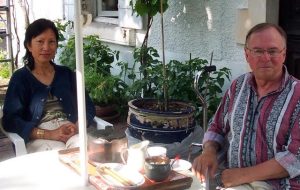
Jean, the eldest of Jacques and Yvette Ellul’s four children (Simon passed away in his youth), earned his doctorate in anthropology, conducting research in Cambodia, where he met his wife, Sivorn. Later in his career he served as a high school teacher. After the death of his father in 1994, Jean was always eager to protect and promote the legacy of Jacques Ellul. In 2020 he gave his enthusiastic blessing to Patrick Chastenet and David Gill as they launched the Association internationale Jacques Ellul and the International Jacques Ellul Society.
May the family be comforted in his memory, and may he rest in peace.
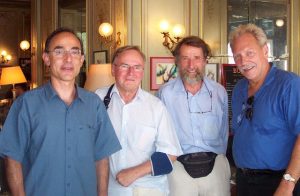
Patrick Chastenet, Jean Ellul, Yves Ellul, David Gill (2006)
Tribute by Carl Mitcham
Albert Borgmann seldom if ever referenced the work of Jacques Ellul, yet many of those influenced by Ellul felt a certain kinship with him.
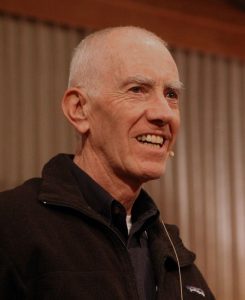 Of the three main approaches that emerged during the classic European period of the development of the philosophy of technology – the analytic (centered in England and North America), the phenomenological (centered in Germany), and the sociological (centered in France) – Borgmann continued and deepened the phenomenological as it was initially found in Heidegger. His direct relationship with Ellul’s sociological criticism was slight. Yet his phenomenological description of what he termed the “device paradigm” (see Technology and the Character of Contemporary Life, 1984) can be read as revealing another way in which Ellul’s La Technique colonizes and distorts material culture. Ellul focused on the distortions of economy, politics, and human relations; Borgmann added the colonization of our quotidian lifeworld of consumer goods. Borgmann’s persistent theme was the ways in which techno-material culture was cutting us off from another reality – or more simply, reality.
Of the three main approaches that emerged during the classic European period of the development of the philosophy of technology – the analytic (centered in England and North America), the phenomenological (centered in Germany), and the sociological (centered in France) – Borgmann continued and deepened the phenomenological as it was initially found in Heidegger. His direct relationship with Ellul’s sociological criticism was slight. Yet his phenomenological description of what he termed the “device paradigm” (see Technology and the Character of Contemporary Life, 1984) can be read as revealing another way in which Ellul’s La Technique colonizes and distorts material culture. Ellul focused on the distortions of economy, politics, and human relations; Borgmann added the colonization of our quotidian lifeworld of consumer goods. Borgmann’s persistent theme was the ways in which techno-material culture was cutting us off from another reality – or more simply, reality.
I discovered Borgmann when reading his small article on “Orientation in Technology” (Philosophy Today, Summer 1972). Shortly after we met in person at the first North American philosophy and technology conference organized by Paul Durbin at the University of Delaware in 1975. It was there that Albert and I initiated a friendship that spanned almost 50 years. During that time I took nourishment from his measured criticism and patient work for renewal, manifest not just in his writing but in years of dedicated teaching at the University of Montana and a life of political engagement in his adopted home. Born in Freiburg, Germany, of Catholic parents, as a young student he immigrated to the United States, married, had a family, and became intentional rooted in Missoula, Montana.
In what is perhaps his last published article, “The End of Technology and the Renewal of Reality” (Glen Miller et al., eds., Thinking through Science and Technology: Philosophy, Religion, and Politics in an Engineered World, 2023), Borgmann describes “technology as the term and the force that is characteristic of the modern era and that began with the Industrial Revolution. But as an animating power it may well have both crested in power and reached the bottom of possibility…. As an animating force that gets us out of bed in the morning and makes us go after more comfort and consumption, it has reached its end, except of course for the poor in this country and around the globe, for the people who are lacking the basic comforts of life. But for the upper and middle classes of the advanced industrial countries, the renewal of the world cannot come from one more iteration of the pattern of comfort and consumption.”
For Borgmann, “The three best-organized and visible enterprises of renewal are the new urbanism, the artisan economy, and organic farming.” How many people are devoted to these tasks? “You can piece together some information from scattered sources, a task beyond my time, I say with sadness. But the mutual awareness of constructive people may yet rise, and if it does, their impact on politics and culture may bring about a wider and deeper renewal of reality.”
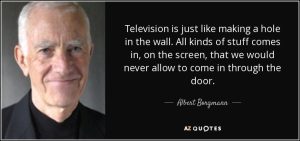
For two extended testimonies to Borgmann as teacher by former students, see:
https://dailynous.com/2023/05/10/albert-borgmann-1937-2023/
https://www.apaonline.org/page/memorial_minutes2023
His wikipedia page includes a list of his main writings.
 Long-time Ellul scholar, IJES friend, and Ellul Forum contributor Marva Dawn died at age 72 on April 18, 2021, at her home in Vancouver, Washington, with her husband Myron Sandberg by her side. Marva was a prolific author and indefatigable teacher and preacher around the globe. She authored more than twenty books which were translated into French, Chinese, Korean, Portuguese, and other languages. All the royalties from her books she directed to support various non-profit organizations. She was also fluent in American Sign Language.
Long-time Ellul scholar, IJES friend, and Ellul Forum contributor Marva Dawn died at age 72 on April 18, 2021, at her home in Vancouver, Washington, with her husband Myron Sandberg by her side. Marva was a prolific author and indefatigable teacher and preacher around the globe. She authored more than twenty books which were translated into French, Chinese, Korean, Portuguese, and other languages. All the royalties from her books she directed to support various non-profit organizations. She was also fluent in American Sign Language.
She taught courses, lectured, and led conferences and retreats at Regent College (Vancouver) and many other universities and seminaries, as well as for churches of all denominations. Although she had health challenges for decades, she was a force of nature, humble but brilliant, insightful, and unfailingly kind and generous. She was a freelance teacher with the organization she founded, Christians Equipped for Ministry.
 Marva was raised a Lutheran, did her undergraduate studies at Concordia University in Chicago, and earned master’s degrees at Pacific Lutheran Seminary, Western Evangelical Seminary, the University of Idaho, and the University of Notre Dame.
Marva was raised a Lutheran, did her undergraduate studies at Concordia University in Chicago, and earned master’s degrees at Pacific Lutheran Seminary, Western Evangelical Seminary, the University of Idaho, and the University of Notre Dame.
It was at Notre Dame that she earned her PhD in Christian ethics, with a brilliant thesis on the New Testament concepts of the “principalities and powers” with special reference to Jacques Ellul’s writings on the subject.
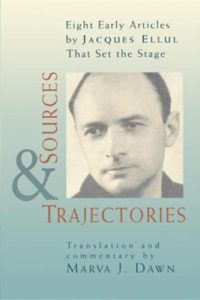 Among her books is Sources and Trajectories: Eight Early Articles by Jacques Ellul That Set the Stage (Eerdmans, 1997), translated with introduction and commentary by Dawn. These essays were written by Ellul mostly in the 1940s.
Among her books is Sources and Trajectories: Eight Early Articles by Jacques Ellul That Set the Stage (Eerdmans, 1997), translated with introduction and commentary by Dawn. These essays were written by Ellul mostly in the 1940s.
I (David Gil) have been using Marva’s Keeping the Sabbath Wholly: Ceasing, Resting, Embracing, Feasting (1989) for decades when teaching or writing about the Decalogue or workplace discipleship and ethics. The Hilarity of Community: Romans 12 and How to Be the Church (1992) is another personal favorite, as she unpacks the biblical text with great insight into the source, and offers great suggestions for application in our technological society (Ellul references of course!).
Marva Dawn was much more than a promoter and scholar of Jacques Ellul’s legacy, but those of us in the International Jacques Ellul Society especially mourn her loss while gratefully celebrating her life and work.
A third work in what could be called Dawn's Powers Trilogy is Powers, Weakness, and the Tabernacling of God (2001). This book provides a critique of Wink's treatment of the powers in his own trilogy of books and builds further on Ellul's Barthian perspective on the powers, wherein it is not the "principalities and powers" themselves that need to be demythologized (à la Bultmann) but rather the myths of the modern powers, such as the state, mammon, and unquestioned scientific progress (p. 22). This perspective recovers a spiritual dimension to the powers which does not detract from the social dimension.
Raymond Downing, IJES Advisory Council member, passed away on January 20, 2020, after a six-month bout with cancer that had first attacked him in 2017. Ray was a physician who earned his MD at New York Medical College in 1975. Ray and his wife, Janice Armstrong, also a doctor, provided health care to people in Appalachia for seven years and for three years on the Navajo Indian Reservation.
Ray served with the Mennonite Central Committee in Sudan and Tanzania. Most of his work was been in Kenya, where he was a practicing physician and instructor in the Department of Family Medicine, Moi University School of Medicine, Eldoret. 
While trained in Western technological medicine, Ray’s approach to health care came first out of his Christian faith in the Anabaptist/Mennonite mode, following Jesus and serving those in need. Ray was always exploring how the biblical stories of healing and disease might have insights important for our modern challenges.
Second, Ray was shaped by listening to the voices and attending to the concerns of the underserved and often ignored. We have much to learn from attitudes and approaches to healing and disease, life, suffering, and death from these folk and their own traditions of healing.
Third, Ray had deeply immersed in the critique of technology and modern biotechnology provided by Jacques Ellul and Ivan Illich. He was a brilliant critic of the narrow, scientific-technical methods of today’s Western medicine. Of course there are benefits, and there is a place for this approach—but not if it dehumanizes and silences patients and communities, not if it commodifies health care, not if it ignores the cultural and even spiritual side of healing and disease, not of treats technology as God . . .
Ray was the author of several books, including Death and Life in America: Biblical Healing and Biomedicine (2008), Biohealth: Beyond Medicalization: Imposing Health (2011), and Global Health Means Listening (2018).
Ray was a longtime member of the International Jacques Ellul Society and delivered a paper at the 2012 Centennial celebration of Jacques Ellul’s birth at our Wheaton Conference.
________________________________________________________
Death & Life in America: Biblical Healing and Biomedicine.
By Raymond Downing
Scottdale PA: Herald Press, 2008. 159 pp.
Reviewed by David W. Gill
Ellul Forum Issue #45 Spring 2010
Raymond Downing and his wife, Dr. Janice Armstrong, both work for the Department of Family Medicine, Moi University School of Medicine, Eldoret, Kenya. Since finishing medical school at the University of Tennessee in 1978, Downing has practiced medicine among the Appalachian poor, on a Navajo Indian Reservation, and in Sudan, Tanzania, and Kenya.
Trained in Western scientific biomedicine -- but with a long clinical experience delivering healing and care outside of the West -- and with a deep immersion in biblical thinking about these topics -- Downing has written a truly outstanding, challenging, thought-provoking work. Western biomedicine is very powerful and Downing says “we need language that enables us to think and write about power.” Biblical language provides great tools and perspectives. Downing’s book sets up a dialogue between modern biomedicine and biblical healing. Downing draws a lot on the insights of Jacques Ellul and two others who were profoundly influenced by Ellul: Ivan Illich and William Stringfellow. He was able to access some of Ellul’s difficult to find writings on medicine and health care. Illich’s Medical Nemesis (1976) and Stringfellow’s A Second Birthday (1970) -- and each of their long personal struggles with serious disease and health issues -- also play large in Downing’s book.
Downing sees 1980 as a true “watershed” year when modern biomedicine yielded, or began yielding to, four trends. First is the dominance of the market, especially after a 1982 FTC decision prohibited the AMA from restricting advertising. Medicine and medical care has since been commodified and hustled for profits and lost its traditional professional ethos. Second, Downing describes how “medicalized prevention” has increased rapidly after 1980. By this he refers to statistical studies of risk factors, increased testing, and precautionary treatments which, while well-intended, disembody the patient.
The third change is the dominance of “systems thinking” -- biotechnology and medicine become a system of which we are a part, instead of thinking of medical “tools” which are used by physicians as appropriate. We become “tools of our tools.” And fourth is the rise of bioethics as a discipline under the simultaneous influence of western moral philosophy and a reductionist view of life as mere biological existence.
With biomedicine outlined in its historical context, Downing then turns to a reading of the healing stories of the Bible . . . from the frequent association of healing with the demonic and exorcism, to Jesus’ admonition to “tell no one” after he healed them, to the raising of Lazarus, to the meaning of spitting on the ground to create some healing mud, to repairing Malchus’s severed ear, to the wounded Beast that is healed in Revelation, to the relationship of forgiveness and sin to healing, to Jesus’ own death and resurrection. It is flat out exciting, challenging, and illuminating to read and reflect on Dr. Downing’s understanding of these amazing texts . . . all the time alongside the work and thinking of modern biomedicine.
In the end, we are not told to abandon all of western scientific biomedicine but rather to dethrone it and restore it to a more humble and appropriate role within a larger frame of reference that is shaped by the revelation and insight of Jesus and Scripture.
This book is a great read for all the health care practitioners and professionals we know. But it is also a great example on a broader level of how to invite the biblical revelation to restructure the way we think about a common topic in our work world. Any workplace disciples and pastors would be inspired and challenged by this book.